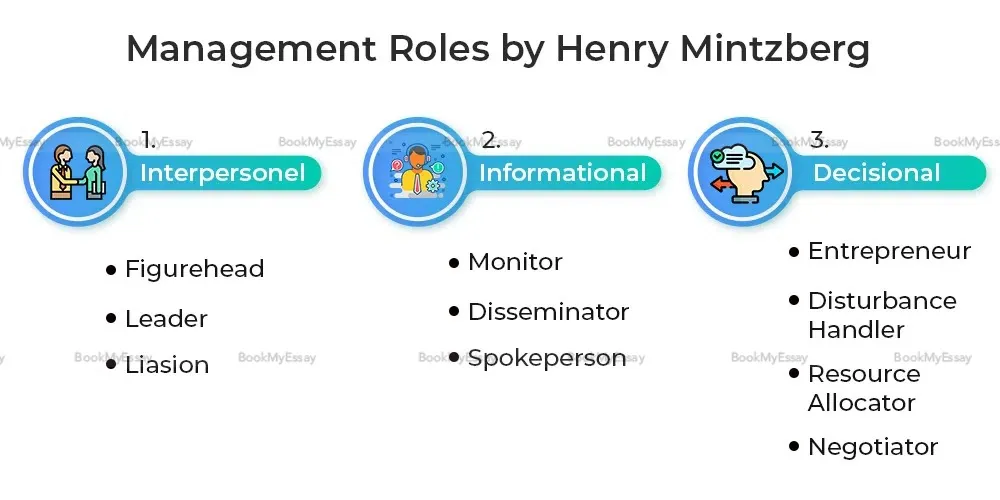Mintzberg Managerial Roles
Mintzberg's managerial roles are crucial in the context of Management Employee Relations assignment help. Mintzberg identified ten managerial roles, categorized into three groups: interpersonal, informational, and decisional. In the realm of Management Employee Relations, these roles play a pivotal role in fostering effective communication and collaboration.
Interpersonal roles, including figurehead, leader, and liaison, emphasize the manager's interactions with employees. This is integral to establishing a positive and productive work environment. The informational roles of monitor, disseminator, and spokesperson highlight the manager's role in gathering and sharing information, which is essential in managing employee expectations and concerns.
Decisional roles, such as entrepreneur, disturbance handler, resource allocator, and negotiator, become particularly relevant when addressing challenges in employee relations. They enable managers to make informed decisions, resolve conflicts, allocate resources effectively, and negotiate mutually beneficial agreements. Understanding and applying Mintzberg's managerial roles is essential for students seeking expertise in Management Employee Relations assignment help, as it provides a comprehensive framework for effective managerial practices in the workplace.
What Are Mintzberg Managerial Roles In Organizational Management?
Mintzberg's managerial roles play a pivotal role in organizational management, particularly in the realm of organizational behavior. Henry Mintzberg, a renowned management theorist, identified ten distinct roles that managers assume within an organization. These roles can be broadly categorized into three groups: interpersonal, informational, and decisional. Interpersonal roles involve interactions with people, such as figurehead, leader, and liaison. Informational roles focus on the gathering, processing, and disseminating of information, encompassing roles like monitor, disseminator, and spokesperson. Decisional roles pertain to the manager's involvement in decision-making processes, including roles like entrepreneur, disturbance handler, resource allocator, and negotiator.
Understanding and effectively navigating these roles are crucial for managers in shaping organizational behavior. The roles facilitate communication, coordination, and decision-making processes, influencing how individuals and groups within the organization interact. By embracing Mintzberg's managerial roles, organizational leaders can enhance their effectiveness in managing people and resources, ultimately contributing to a positive and productive organizational behavior.

How Do Interpersonal Roles Differ From Informational Roles In Mintzberg Framework?
In Mintzberg's managerial framework, interpersonal roles and informational roles represent distinct functions crucial for effective leadership. Interpersonal roles, including figurehead, leader, and liaison, focus on relationships within and outside the organization. These roles emphasize the manager's interactions with people, symbolizing authority, guiding teams, and fostering connections. Conversely, informational roles involve activities like monitoring, disseminating, and spokesperson duties. Managers in these roles gather, process, and share information vital for decision-making and organizational functioning. When seeking "Assignment Help Online" to understand these roles, students should prioritize resources that explain the nuances of interpersonal and informational roles. Assistance in comprehending how managers navigate interpersonal dynamics and information flows is integral to mastering Mintzberg's framework. Online platforms offering assignment help can provide valuable insights and support, aiding students in grasping these managerial concepts and applying them effectively in academic tasks.
Can You Explain Mintzberg` Concept Of Decisional Roles In Management?
Examining the various methods for Customer Relationship Management (CRM) within Mintzberg's concept of decisional roles in management provides valuable insights into how leaders navigate organizational challenges. Mintzberg identified four decisional roles: entrepreneur, disturbance handler, resource allocator, and negotiator. In the context of CRM, the entrepreneur role involves exploring innovative CRM strategies to enhance customer interactions and satisfaction. Disturbance handling becomes crucial when addressing issues within customer relationships, requiring swift decisions to maintain equilibrium.
As a resource allocator, managers decide on the allocation of resources for CRM initiatives, ensuring optimal utilization of funds and manpower. Negotiating plays a pivotal role in forming alliances with external entities or resolving conflicts within the organization related to CRM practices. Mintzberg's decisional roles framework underscores the multifaceted nature of managerial responsibilities in the realm of customer relationship management, emphasizing the need for strategic decision-making to foster positive customer experiences and sustainable business relationships.
What Are The Three Categories Of Managerial Roles According To Mintzberg?
In the realm of management, Mintzberg's framework delineates three pivotal categories of managerial roles, shedding light on the multifaceted nature of managerial responsibilities. First and foremost, interpersonal roles embody the manager as a figurehead, liaison, and leader, emphasizing the significance of interpersonal relationships within an organization. Secondly, informational roles encapsulate the manager's role as a monitor, disseminator, and spokesperson, underscoring the importance of information flow and communication. Lastly, decisional roles encapsulate the manager's role as an entrepreneur, disturbance handler, resource allocator, and negotiator, highlighting the critical decision-making processes managers undertake.
For individuals grappling with the intricacies of these managerial roles, seeking guidance from a proficient assignment help provider can be instrumental. Such providers offer tailored assistance, ensuring a comprehensive understanding of Mintzberg's managerial roles and facilitating the mastery of management concepts. Accessing the expertise of an assignment help provider can empower aspiring managers to navigate the complexities of their roles with confidence and proficiency.
How Does BookMyEssay Assist In Understanding Mintzberg Managerial Roles?
BookMyEssay serves as a valuable resource for comprehending Mintzberg's managerial roles by offering expert assistance and comprehensive insights. Mintzberg's managerial roles, comprising interpersonal, informational, and decisional dimensions, can be intricate for students to grasp. BookMyEssay bridges the knowledge gap by providing well-researched content, elucidating the nuances of Mintzberg's theories.
Through meticulously crafted study materials, BookMyEssay elucidates how Mintzberg's roles manifest in real-world managerial scenarios. The platform employs seasoned professionals who offer personalized guidance, clarifying doubts and enhancing understanding. By presenting case studies and practical examples, BookMyEssay brings theoretical concepts to life, aiding learners in connecting abstract ideas to practical applications.
Furthermore, the platform facilitates interactive sessions and discussion forums, fostering a collaborative learning environment. Whether deciphering the intricacies of interpersonal relationships or deciphering the decision-making processes, BookMyEssay's support ensures students gain a comprehensive understanding of Mintzberg's managerial roles, empowering them to excel in academic pursuits and future professional endeavors.







 3 Bellbridge Dr, Hoppers Crossing, Melbourne VIC 3029
3 Bellbridge Dr, Hoppers Crossing, Melbourne VIC 3029




